| Listing 1 - 8 of 8 |
Sort by
|
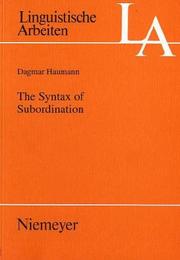
ISBN: 3484303735 3110922134 9783110922134 9783484303737 Year: 1997 Publisher: Tübingen Max Niemeyer
Abstract | Keywords | Export | Availability | Bookmark
 Loading...
Loading...Choose an application
- Reference Manager
- EndNote
- RefWorks (Direct export to RefWorks)
This study is concerned with the categorial status of subordinating conjunctions and the internal and external structure of subordinate clauses. Starting out from the categorizations of subordinating conjunctions that prevail in recent generative linguistic theory, namely complementizers and prepositions, and from the division of syntactic categories into lexical and functional ones, the author investigates the lexical and grammatical properties of subordinating conjunctions which are held to account for both the distribution and the architecture of subordinate clauses. Central to this study is the relation between the category subordinating conjunction, the licensing of its projection and the licensing of its complement and specifier position. Part I is concerned with subordination in early Generative Grammar, the rise of the category C and the categorization of subordinating conjunctions. Part II focuses on recent conceptions of phrase structure, the inventory of syntactic categories, the lexical-functional dichotomy and syntactic movement. Part III is concerned with the lexical properties of complementizers (C), prepositions (P), and a third category of subordinating conjunctions (Subcon) which conflates properties of Cs and Ps. This categorization of subordinating conjunctions is arrived at on the basis of the distribution of the phrases they head and the mechanisms by which these elements license their complement and specifier. Cs, as typical functional heads, license both theirs complement and their specifier on the basis of feature checking mechanisms; Ps, as typical lexical heads, license these positions by theta-marking them. Within SubconP the complement is licensed by feature checking as within CP, and the specifier is licensed by theta-marking as within PP.
Generatieve spraakkunst --- Grammaire générative --- Grammaire transformationnelle --- Grammar [Comparative and general ] -- Derivation --- Grammar [Generative ] --- Grammar [Transformational ] --- Grammar [Transformational generative ] --- Grammatica [Generatieve ] --- Grammatica [Transformationele ] --- Spraakkunst [Generatieve ] --- Spraakkunst [Transformationele ] --- Transformationele grammatica --- Transformationele spraakkunst --- Transformationele taaltheorie --- Grammar --- English language --- Grammar, Comparative and general --- Subordination (Linguistics) --- Subordinate constructions --- Syntax --- Subordination --- Grammar [Comparative and general ] --- Generative grammar --- Subordinate constructions. --- Germanic languages --- Linguistics --- Philology
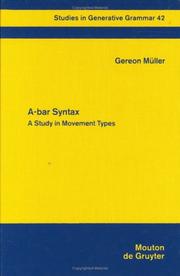
ISBN: 3110144697 1306275393 3110814285 9783110814286 9783110144697 Year: 1995 Volume: 42 Publisher: Berlin: Mouton de Gruyter,
Abstract | Keywords | Export | Availability | Bookmark
 Loading...
Loading...Choose an application
- Reference Manager
- EndNote
- RefWorks (Direct export to RefWorks)
Grammar --- Generatieve spraakkunst --- Generative grammar --- Grammaire générative --- Grammaire transformationnelle --- Grammar [Comparative and general ] -- Derivation --- Grammar [Generative ] --- Grammar [Transformational ] --- Grammar [Transformational generative ] --- Grammatica [Generatieve ] --- Grammatica [Transformationele ] --- Principes en parameters (Taalwetenschap) --- Principes et paramètres (Linguistique) --- Principles and parameters (Linguistics) --- Spraakkunst [Generatieve ] --- Spraakkunst [Transformationele ] --- Transformational generative grammar --- Transformational grammar --- Transformationele grammatica --- Transformationele spraakkunst --- Transformationele taaltheorie --- Grammar, Comparative and general --- Generative grammar. --- Syntax. --- Language and languages --- Syntax --- Grammar, Generative --- Grammar, Transformational --- Grammar, Transformational generative --- Derivation --- Psycholinguistics --- Grammar [Comparative and general ] --- Linguistics --- Philology --- Grammar, Comparative and general - Syntax. --- Grammar, Comparative and general Syntax
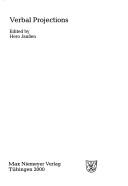
ISBN: 3484304200 3110929929 9783110929928 9783484304208 Year: 2000 Volume: 420 Publisher: Tübingen Max Niemeyer Verlag
Abstract | Keywords | Export | Availability | Bookmark
 Loading...
Loading...Choose an application
- Reference Manager
- EndNote
- RefWorks (Direct export to RefWorks)
This collection of articles examines lexical and grammatical aspects of verbal elements and phrases in the context of recent generative research. General questions concern definitions of grammatical categories, classifications of auxiliaries and particles as functional categories, and problems of economy. Lexical matters range from affixation and category change (participles, gerunds) to semantic representations of specific verb classes (possessive, phrasal and intransitive verbs). The syntactic analyses focus on positional arrangements of aspectual and verbal units (V2, Verb Raising).
Generatieve spraakkunst --- Generative grammar --- Grammaire générative --- Grammaire transformationnelle --- Grammar [Comparative and general ] -- Derivation --- Grammar [Generative ] --- Grammar [Transformational ] --- Grammar [Transformational generative ] --- Grammatica [Generatieve ] --- Grammatica [Transformationele ] --- Spraakkunst [Generatieve ] --- Spraakkunst [Transformationele ] --- Transformational generative grammar --- Transformational grammar --- Transformationele grammatica --- Transformationele spraakkunst --- Transformationele taaltheorie --- Grammar, Comparative and general --- -Grammar, Comparative and general --- -Lexicology --- English language --- Language and languages --- Comparative grammar --- Grammar --- Grammar, Philosophical --- Grammar, Universal --- Philosophical grammar --- Linguistics --- Philology --- Grammar, Generative --- Grammar, Transformational --- Grammar, Transformational generative --- Psycholinguistics --- Grammatical categories --- Verbals --- Lexicology --- Grammar, Comparative --- Derivation --- Verbals (Grammar) --- Verbids (Grammar) --- Categories, Grammatical --- Categorization (Linguistics) --- Componential analysis (Linguistics) --- Verb phrase --- Major form classes --- Verb --- Germanic languages --- Lexicology. --- Generative grammar. --- Verbals. --- Grammatical categories.
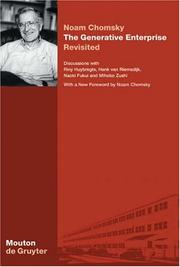

ISBN: 3110180014 3110902443 9783110902440 9783110180015 Year: 2004
Abstract | Keywords | Export | Availability | Bookmark
 Loading...
Loading...Choose an application
- Reference Manager
- EndNote
- RefWorks (Direct export to RefWorks)
Spanning more than two decades of thinking about generative approaches to Universal Grammar, the two interviews with Noam Chomsky in this book permit a rare and illuminating insight into his views on numerous issues in linguistics and beyond. The first discussion dates from the early days of the so-called Government Binding Theory, the second one took place after a decade of Minimalism. Thereby the evolution and the dynamics in linguistic theorizing are dramatically revealed. Scholars of grammar, cognitive scientists, philosophers will profit by reading this book, but anyone with an ardent
Generative grammar. --- Linguistics. --- Generatieve spraakkunst --- Generative grammar --- Grammaire générative --- Grammaire transformationnelle --- Grammar [Comparative and general ] -- Derivation --- Grammar [Generative ] --- Grammar [Transformational ] --- Grammar [Transformational generative ] --- Grammatica [Generatieve ] --- Grammatica [Transformationele ] --- Langage [Sciences du ] --- Langage [théorie du ] --- Linguistic science --- Linguistics --- Linguistique --- Linguïstiek --- Science of language --- Sciences du langage --- Spraakkunst [Generatieve ] --- Spraakkunst [Transformationele ] --- Taalkunde --- Taalwetenschap --- Théories du langage --- Transformational generative grammar --- Transformational grammar --- Transformationele grammatica --- Transformationele spraakkunst --- Transformationele taaltheorie --- 801.56 --- 801.56 Syntaxis. Semantiek --- Syntaxis. Semantiek --- Grammar, Comparative and general --- Grammar, Generative --- Grammar, Transformational --- Grammar, Transformational generative --- Derivation --- Language and languages --- Psycholinguistics
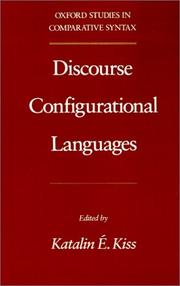
ISBN: 0195088344 0195088336 1280534877 0195358503 9780195358506 9780195088335 9786610534876 661053487X 9780195088342 0197721540 9781280534874 Year: 1995 Volume: *2 Publisher: New York Oxford Oxford University Press
Abstract | Keywords | Export | Availability | Bookmark
 Loading...
Loading...Choose an application
- Reference Manager
- EndNote
- RefWorks (Direct export to RefWorks)
Generatieve spraakkunst --- Generative grammar --- Grammaire générative --- Grammaire transformationnelle --- Grammar [Comparative and general ] -- Derivation --- Grammar [Generative ] --- Grammar [Transformational ] --- Grammar [Transformational generative ] --- Grammatica [Generatieve ] --- Grammatica [Transformationele ] --- Spraakkunst [Generatieve ] --- Spraakkunst [Transformationele ] --- Transformational generative grammar --- Transformational grammar --- Transformationele grammatica --- Transformationele spraakkunst --- Transformationele taaltheorie --- Grammar, Comparative and general --- Grammaire générative --- Sujet et prédicat --- Topic and comment --- Functional sentence perspective (Grammar) --- Predicate and subject (Grammar) --- Subject and predicate (Grammar) --- Theme and rheme --- Topic and comment (Grammar) --- Focus (Linguistics) --- Grammar, Generative --- Grammar, Transformational --- Grammar, Transformational generative --- Psycholinguistics --- Subject and predicate --- Syntax --- Derivation --- Grammar [Comparative and general ] --- Generative grammar. --- Topic and comment. --- Linguistics --- Philology
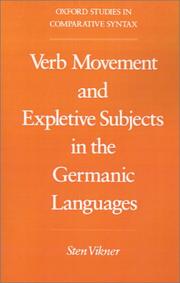
ISBN: 0195083946 0195083938 0195359259 128044360X 1601299400 9780195083941 9780195083934 9781601299406 9780195359251 9786610443604 6610443602 0197722776 Year: 1995 Volume: *4 Publisher: New York (N.Y.) : Oxford university press,
Abstract | Keywords | Export | Availability | Bookmark
 Loading...
Loading...Choose an application
- Reference Manager
- EndNote
- RefWorks (Direct export to RefWorks)
This is a comparative study opf two different kinds of verb movement in the Germanic languages, using the Government and Binding Theory. One involves the position of the finite verb, and the other the possible positions of the "logical" subject in constructions with expletive subjects. Vikner includes in his study the less commonly discussed Germanic languages of Icelandic, Faroese, and Yiddish.
Germanic languages --- Grammar --- Generatieve spraakkunst --- Generative grammar --- Government-binding theory (Linguistics) --- Grammaire générative --- Grammaire transformationnelle --- Grammar [Comparative and general ] -- Derivation --- Grammar [Generative ] --- Grammar [Transformational ] --- Grammar [Transformational generative ] --- Grammatica [Generatieve ] --- Grammatica [Transformationele ] --- Liage et gouvernement [Théorie de ] --- Regeer- en bindtheorie (Taalwetenschap) --- Spraakkunst [Generatieve ] --- Spraakkunst [Transformationele ] --- Transformational generative grammar --- Transformational grammar --- Transformationele grammatica --- Transformationele spraakkunst --- Transformationele taaltheorie --- Langues germaniques --- Théorie du liage et du gouvernement (Linguistique) --- Subjectless constructions --- Syntax --- Verb phrase --- Impersonnels --- Syntaxe --- Syntagme verbal --- 803 --- -Germanic languages --- -Generative grammar --- Binding theory (Linguistics) --- Government and binding (Linguistics) --- Linguistics --- Grammar, Comparative and general --- Grammar, Generative --- Grammar, Transformational --- Grammar, Transformational generative --- Psycholinguistics --- Teutonic languages --- Indo-European languages --- Germaanse taalkunde --- Derivation --- Germanic Languages --- Languages & Literatures --- Generative grammar. --- Subjectless constructions. --- Syntax. --- Verb phrase. --- 803 Germaanse taalkunde --- Government-binding theory (Linguistics). --- Grammaire générative --- Théorie du liage et du gouvernement (Linguistique) --- Germanic languages - Verb phrase. --- Germanic languages - Subjectless constructions. --- Germanic languages - Verb phrase --- Germanic languages - Syntax --- Germanic languages - Subjectless constructions
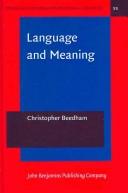
ISBN: 9027215642 9786612156212 1282156217 9027293929 Year: 2005 Volume: 55
Abstract | Keywords | Export | Availability | Bookmark
 Loading...
Loading...Choose an application
- Reference Manager
- EndNote
- RefWorks (Direct export to RefWorks)
This book illustrates the structuralist idea that language creates the reality we perceive. The data presented in this volume focus on the problematic issues of the passive construction and irregular (strong) verbs, with examples taken primarily from English with separate subsections on German and Russian. The author presents a new and different analysis of these complex topics which proceeds from the levels of form to meaning rather than the traditional and generative methodologies that follow the opposite path from meaning to form. This book will be of interest to all linguists who have ever confronted the controversial question of the interaction between lexical exceptions and grammatical rules. The scope of this volume is rather broad and it compares and contrasts text grammar versus sentence grammar in an innovative way.
Generatieve spraakkunst --- Generative grammar --- Grammaire générative --- Grammaire transformationnelle --- Grammar [Comparative and general ] -- Derivation --- Grammar [Generative ] --- Grammar [Transformational ] --- Grammar [Transformational generative ] --- Grammatica [Generatieve ] --- Grammatica [Transformationele ] --- Linguistics [Structural ] --- Linguistique structurale --- Linguïstiek [Structurele ] --- Spraakkunst [Generatieve ] --- Spraakkunst [Transformationele ] --- Structural linguistics --- Structurele linguïstiek --- Structurele taalwetenschap --- Taalwetenschap [Structurele ] --- Transformational generative grammar --- Transformational grammar --- Transformationele grammatica --- Transformationele spraakkunst --- Transformationele taaltheorie --- 801.56 --- 801.56 Syntaxis. Semantiek --- Syntaxis. Semantiek --- German language --- Russian language --- Linguistics --- Slavic languages, Eastern --- Ashkenazic German language --- Hochdeutsch --- Judaeo-German language (German) --- Judendeutsch language --- Judeo-German language (German) --- Jüdisch-Deutsch language --- Jüdischdeutsch language --- Germanic languages --- Grammar, Comparative and general --- Grammar, Generative --- Grammar, Transformational --- Grammar, Transformational generative --- Psycholinguistics --- Grammar, Comparative&delete& --- Russian --- German --- Derivation --- Grammar [Comparative ] --- Grammar, Comparative --- Structural linguistics. --- Generative grammar. --- German. --- Russian.
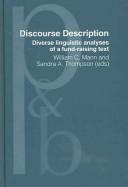
ISSN: 0922842X ISBN: 1556192886 9027250324 9786613092762 128309276X 9027285950 9789027250322 9789027285959 9781556192883 9781283092760 6613092762 Year: 1992 Volume: new ser. 20 Publisher: Amsterdam : Benjamins,
Abstract | Keywords | Export | Availability | Bookmark
 Loading...
Loading...Choose an application
- Reference Manager
- EndNote
- RefWorks (Direct export to RefWorks)
This book is about a theory of language that combines two observations (1) that language is based on an extensive cognitive infrastructure (cognitivism) and (2) that it is functional for its user (functionalism). These observations are regarded as two dimensions of one phenomenon that both need to be accounted for, simultaneously and coherently, in accounting for language. Chapter 1 presents the cognitivist and functionalist points of view and their interrelation and discusses the integration of language research under a cognitive umbrella; the issue of defining 'functions of language', and th
Cognitie --- Cognition --- Fonctionalisme (Linguistique) --- Functionalism (Linguistics) --- Functionalisme (Taalwetenschap) --- Generatieve spraakkunst --- Generative grammar --- Grammaire générative --- Grammaire transformationnelle --- Grammar [Comparative and general ] -- Derivation --- Grammar [Generative ] --- Grammar [Transformational ] --- Grammar [Transformational generative ] --- Grammatica [Generatieve ] --- Grammatica [Transformationele ] --- Langage [Psychologie du ] --- Langage et langues--Aspect psychologique --- Langage et langues--Psychologie --- Langage et psychanalyse --- Langage--Aspects psychologiques --- Langage--Psychologie --- Language and psychoanalysis --- Language--Psychological aspects --- Language--Psychology --- Langues--Psychologie --- Parole--Psychologie --- Psychanalyse et langage --- Psychoanalyse en taal --- Psychoanalysis and language --- Psycholinguistics --- Psycholinguistique --- Psychologie du langage --- Psychologie van de taal --- Spraakkunst [Generatieve ] --- Spraakkunst [Transformationele ] --- Taal en psychoanalyse --- Taal--Psychologie --- Taal--Psychologische aspecten --- Taalpsychologie --- Transformational generative grammar --- Transformational grammar --- Transformationele grammatica --- Transformationele spraakkunst --- Transformationele taaltheorie --- Fonctionnalisme (Linguistique) --- Grammaire générative --- Cognitive psychology --- Pragmatics --- Psycholinguistics. --- Cognition. --- Generative grammar. --- Fonctionnalisme (linguistique) --- Théorie de la connaissance --- Grammar, Comparative and general --- Grammar, Generative --- Grammar, Transformational --- Grammar, Transformational generative --- Functional analysis (Linguistics) --- Functional grammar --- Functional linguistics --- Functional-structural analysis (Linguistics) --- Grammar, Functional --- Grammatical functions --- Linguistics --- Structural linguistics --- Psychology --- Language, Psychology of --- Language and languages --- Psychology of language --- Speech --- Thought and thinking --- Derivation --- Psychological aspects
| Listing 1 - 8 of 8 |
Sort by
|

 Search
Search Feedback
Feedback About UniCat
About UniCat  Help
Help News
News